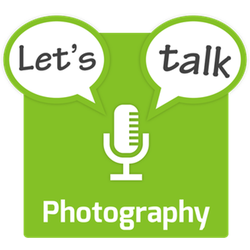Panel
- Bart Busschots (host) – @bbusschots – Flickr
In this solo show Bart pontificates on just one word — Luck. It’s essential, but not sufficient, and understanding its role will transform it from your nemesis into an opportunity.
While this podcast is free for you to enjoy, it’s not free for Bart to create. Please consider supporting the show by becoming a patron on Patreon.
Reminder – you can submit questions for future Q & A shows at http://lets-talk.ie/photoq
Notes
When I tell people great photos require luck they often look horrified, like that means they are powerless and just at the mercy of the whims of serendipity, but it’s really not like that at all!
I’m not saying you need luck to get good photos, nor even excellent photos, but you do need it to get truly GREAT photos — those rarest of gems that grab every eye and elicit exclamations of delight from everyone, random strangers and passionate photographers alike.
Luck is a Force-Multiplier
When I'm being scientific I describe luck as a force-multiplier, because it can't get you to anywhere from zero, but if you at least fire the shutter, it can boost your shot from where it would have been to something better. When I'm being more informal I refer to it as being like one of those magical mushrooms in the original Mario side scroller games from Nintendo — you never know when your little boost is coming, but when it appears you can do things utterly beyond your regular skill levels. But of course, luck, like a Mario mushroom can't be relied on, and if you don’t know what you’re doing, it’s wasted on you!
So you need luck, but is that enough? Absolutely not!
Luck is Required but not Sufficient
There's simply no shortcut for building a body of high quality work — you simply have to hone all aspects of your craft, and that takes time, effort, and experience.
You need to take the time to learn the theory. Maybe you’re a savant who can intuit everything, but probably not. Generations have dedicated vast swaths of their time studying every aspect of the art and craft of photography, and distilling what they’ve learned into books and articles — capitalise on their hard work and absorb as much of it as you can, because you can’t possibly recreate all that by yourself!
In the abstract, all the knowledge in the world won’t get you very far. You need to really study other people’s work to understand how the theories can be expressed, and you need to reflect on which works you like, which you don’t, and most importantly, why!
You need to take the time to reflect on your own work — to honestly as yourself what’s working and what’s not. What needs attention, what’s just a waste of your time? What could you try next?
And of course, to get good at the practical stuff you simply need experience. Hours and hours of it — 10,000 apparently!
Everyone gets lucky and snaps a shot above their skill level from time to time. What skill and experience bring is the ability to bring your hit rate up and your miss rate down. To know that if you go shoot something you’ll definitely come home with something good.
But no matter how good you get, the truly great shots still need that little bit of luck!
Maximise Your Opportunities
I want to really focus in on the most critical point of all — luck can't elevate the shots you never take! If you multiply anything by zero, you still get zero, and if you never play Mario, you'll never get one of those cool mushrooms!
But there's even more to it than that — how many un-likely things actually happen for you depends not just how how unlikely they are, but on how many tries you take!
For simplicity, let's imagine getting a great shot is like rolling a double-six with a regular pair of dice. Every shutter press is a roll of the dice. If you only take 50 shots a year you could very easily get no great shot at all! One in 36 chances don't happen exactly every 36 times, your actual experience will vary, but over enough rolls, the natural fluctuations fade away, and your actual success rate approaches the calculated rate of one in thirty six. So, if you roll the dice five thousand times your actual hit count will be most probably be within just one or two of the mathematically calculated expected 138.888889 (recurring), 40 or 41 if you've been a little luckier than average, but maybe 37 or 38 if you're on the other side of the distribution.
Great photographic shots don't happen nearly as often as double sixes, so if the probability is even as low as one in ten thousand, then even shooting twelve thousand shots wouldn't be enough to guarantee you one great one!
So, what the reality that truly great photos require a little luck means is that you need to maximise the opportunity for luck to strike. Shooting more actually helps in two ways, not only does it mathematically increase your chances of that one in a million shot, it also helps you get the practice and experience you need to raise your baseline, so you'll need much less of a boost from serendipity, and less unlikely luck is way more common than very rare luck!
Keep Your Eyes Open and Your Camera With You!
There are two ways to guarantee you'll miss great shots — not even noticing the opportunity exists, and noticing, but not having a camera to hand. The second is the most frustrating because it's like the fish that got away, you know you missed one of your double sixes! But I imagine just not noticing opportunities is a much bigger problem. It just takes one or two missed opportunities to get your right into the habit of never leaving home without a camera!
In the days before our smartphones became excellent cameras it was the done thing to have a small point-and-shoot camera to compliment your great big SLR — you'd keep that little point-and-shoot in your pocket, bumbag (fannypack in the US), or purse, at all times, and you might also keep your SLR in your car so it was at least near by most of the time for those longer-lived unexpected opportunities.
Now, I shoot everything with my phone anyway, so that part of the equation is just not an issue for me.
The bit that takes more work is developing the habit of always keeping your eyes open, and trying to notice any and every cool subject, cool shape, cool texture, cool colour, or amazing bit of light, and having the discipline to pull over in your car or on your bike (always safely!), to pause your walk, or even to interrupt a conversation, whip your camera out, and have a snap!
For my physical and mental health I make a point of getting out for a walk and a cycle every day, and since I get to choose my routes, I can try to maximise the amount of nature and local history I pass each day. I pass the same pretty church or old ruin tens or hundreds of times a year, and mostly, I just pass by, but every now and then, the light is just right, or the field in front is has been freshly ploughed so there are amazing leading lines, or the crop is perfectly ripe, or goodness know what, and then, on those days, I pull over or pause my walk and take that shot half minute to grab I need to grab a handful of shots at a few zoom levels and with a few compositions, then triage them later.
Similarly, I've found four walking routes that are the perfect length and pass through some nice bits of nature, so I see the same landscape day in and day out, and most days, I don't shoot anything, but when I notice a new flower, or a freshly ripe berry, or an unusual butterfly or bird, of the light is perfect, or what ever, I pause and grab the shot!
On work days I keep my eyes open for opportunities as I move around the campus on my way from meeting to meeting or what ever. Even when I'm on the road I still keep my eyes peeled. You just never know what serendipity will throw your way!
Giving yourself lots of random opportunities and always having a camera get you a very long way to maximising the quality of your total body of work, but you can do a little bit more with some deliberate situational awareness. Exactly what that means for your will depend on where you live and the kinds of subjects you like, but let me give you some examples from my life to demonstrate the idea.
I love getting astronomical objects into my landscape shots, so I make a point of keeping an eye on the current phase of the Moon, the location of all the bright planets, and any predictable interesting events like alignments and eclipses, and I keep an eye on the astronomical news for most unexpected surprises like passing comets!
Similarly, I'm a railway buff, so I know the rough timetables and keep the real-time rail app on my home screen so I can always do a quick check of what traffic is expected at any time on any line. I'm also an aviation geek, so I know the standard approaches to the nearby Dublin airport and which ones will almost certainly be in use in which wind conditions. Heck, I can even recognise the STAR in use based on where in the sky I see planes on any given day! I guess that fact that one of the STARs sends jets directly over my house helps a little
I also combine these things, on days when the Moon is going to be low in the sky and I know which STAR is likely to be in use, I choose my cycle route so there's a good chance I'll get a low-flying jet in the same telephoto field of view as the Moon!
Luck is not Your Nemesis, it's Your Opportunity
Basically, the fact that great shots take a little luck is nothing to fear, it's an opportunity! If you put in the effort to maximise your chances, it's almost inevitable Fortuna will reward you, and more your keep your eyes open and your shutter firing, the more great shots your portfolio will amass!

